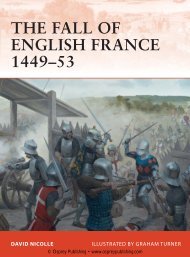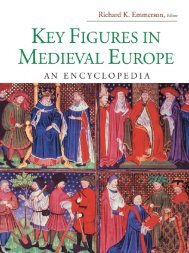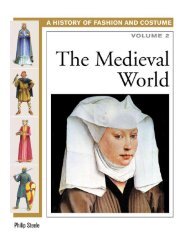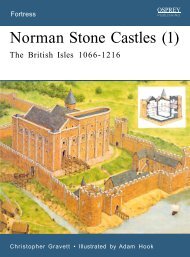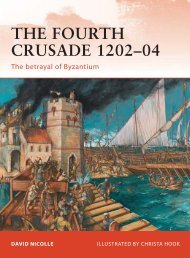Osprey - General Military - Knight - The Warrior and ... - Brego-weard
Osprey - General Military - Knight - The Warrior and ... - Brego-weard
Osprey - General Military - Knight - The Warrior and ... - Brego-weard
Create successful ePaper yourself
Turn your PDF publications into a flip-book with our unique Google optimized e-Paper software.
26<br />
KNIGHT<br />
the incomes to afford to maintain themselves with full armour <strong>and</strong> horses, but they<br />
were now tied to the particular lord to whom they owed service rather than directly<br />
to the king. Armies were no longer recruited <strong>and</strong> organized directly by royal officials;<br />
instead they were made up of the aristocratic elite <strong>and</strong> their b<strong>and</strong>s of followers, coming<br />
together to serve in royal armies at the behest of the court. As long as the Carolingian<br />
monarchs pursued aggressive campaigns - pushing the borders of their l<strong>and</strong>s into<br />
Saxony, Bavaria <strong>and</strong> down into Lombardy as well as westwards over the Pyrenees -<br />
then these noble households were willing <strong>and</strong> eager to serve, as there was loot <strong>and</strong><br />
more l<strong>and</strong> to be gained. When the limits of that expansionist policy had been reached,<br />
however, <strong>and</strong> the focus switched instead to defensive campaigns against the invading<br />
Viking armies, it became much more difficult to persuade the aristocratic class to<br />
respond to calls to serve. <strong>The</strong> benefits of campaigning were simply not enough of an<br />
incentive for them to muster. It is at this point that we start to see monarchs trying to<br />
regulate the terms of the military service they were to receive, with the imposition of<br />
penalties for failure to appear at musters.<br />
In spite of the dominant position of the aristocracy in the way in which armies were<br />
raised <strong>and</strong> structured in this period, the Carolingian monarchs were still able to use the<br />
household troops that we saw some two centuries before. Scarae continued to be used<br />
by monarchs as a quick reaction force, <strong>and</strong> the b<strong>and</strong>s of pueri continued to serve out<br />
their apprenticeships within the royal household, before moving on to marry <strong>and</strong> take<br />
l<strong>and</strong> of their own. <strong>The</strong> kings were not above employing mercenary forces, including<br />
Viking raiders, who could be turned against other Viking b<strong>and</strong>s or indeed rebel lords.<br />
<strong>The</strong> Duchy of Norm<strong>and</strong>y was founded in this way, created from l<strong>and</strong> already colonized<br />
by the Viking leader Rollo, who was confirmed as duke of Norm<strong>and</strong>y by the Frankish<br />
king Charles the Simple in 912.<br />
<strong>The</strong> fragmentation of the Carolingian Empire after the death of Charles the Fat in<br />
888 ensured that the aristocratic elite continued to grow in power at the expense of<br />
royal government. By the time Hugh Capet succeeded to the throne of France in 939,<br />
the French kings were little different from the aristocratic elite; indeed they were less<br />
powerful than many aristocrats (it would take nearly three hundred years for them to<br />
be able to fully assert their regal authority). In effect the counts <strong>and</strong> dukes of the various<br />
French provinces were monarchs in all but name, raising their own armies <strong>and</strong> fighting<br />
internecine wars against each other with scant regard for royal authority. Such conflict<br />
encouraged the support <strong>and</strong> maintenance of small numbers of heavily armed <strong>and</strong><br />
armoured professional soldiers, mounted so as to be able to raid swiftly into an enemy's<br />
territory, or to respond to such raids themselves. <strong>The</strong> lords recruited these men from<br />
amongst the peasant population, adding them to their aristocratic households under<br />
the title of vcuhnut ('vassal') or, more commonly miles-, the knight had come of age.



